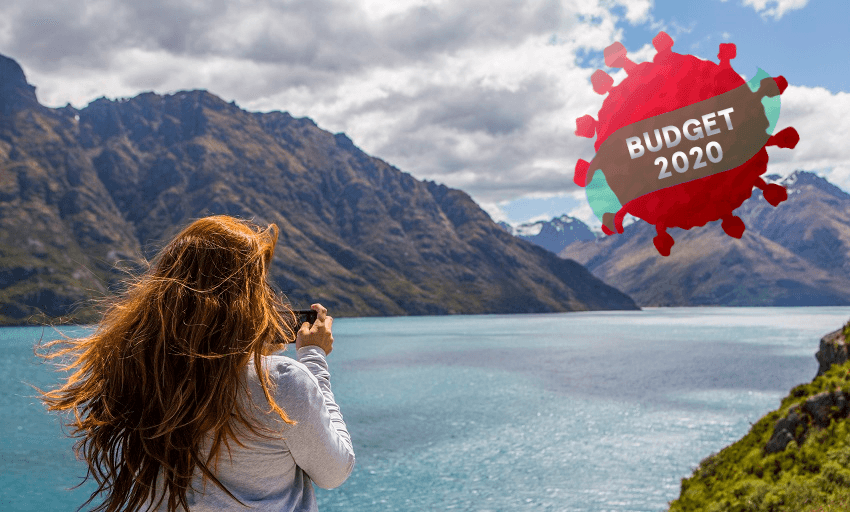Budget 2020: The tourism sector was holding out hope for a lifeline to come in the form of yesterday’s budget. It didn’t come, and now its leaders say they’re drowning.
Members of the beleaguered tourism industry say the support they’ve been offered is a drop in the bucket compared to what is necessary given the near-total shutdown of all travel into and around New Zealand.
The budget includes an eight-week extension to the employee wage subsidy for hard-hit industries, including tourism, along with a $400 million Tourism Recovery Fund. While details on where that money will go are still thin, finance minister Grant Robertson said yesterday it will support a transitions programme to help businesses “plan for the next steps”, a fund to ensure key tourism assets survive, a domestic tourism marketing campaign, and a “public/private taskforce to shape the future of the tourism industry”.
Those measures just won’t cut it, say those at the front lines of the historic crisis.
Yesterday was “a sad day for all businesses involved in the international tourism sector”, said Lynda Keene, chief executive of the NZ Tourism Export Council. “The government has failed the international tourism sector and appears to have given up on an industry that has produced so much for the New Zealand economy and society.”
NZTEC represents in-bound tour operators (ITOs), which sell services to international travellers arriving in New Zealand. Keene says that without targeted support, the pipeline of future business through ITOs will “wither away”, effectively cancelling a stream of existing bookings stretching from this October through to 2023, by which time the coronavirus, it is hoped, will be overcome worldwide.
Keene’s comments are echoed by Eve Lawrence, general manager at touring and accommodation provider Haka Travel. The budget was “wildly disappointing” for the tourism industry, she said. While getting an extension to the wage subsidy scheme originally scheduled to expire in June came as a relief, an eight-week extension will only delay redundancies, not avert them, she said.
The size of the support package was a particularly bitter pill to swallow in light of the $72.5 million going to support the horse racing industry post-Covid, said Lawrence.
“Horse racing contributes $1.6 billion a year to the economy. Tourism contributes $42 billion, therefore we should have received a package that was around 26 times larger than theirs – which would be in the region of $1.8 billion.” The Tourism Recovery Fund announced yesterday is worth $400 million.
“Considering we’re one of the three pillars that hold up this economy, I’m so disappointed I can’t even begin to tell you,” Lawrence said.
With Covid-19 all but obliterating one of our biggest industries – Lawrence says the consensus among her colleagues is that they expect to make 20% of last year’s revenue, “if we’re lucky” – the pressure is on to come up with an alternative vision. Tourism minister Kelvin Davis spoke last month of needing to “rethink the entire way we approach tourism” in the wake of the pandemic, “to ensure that it will make New Zealand a more sustainable place, enrich the lives of all our people and deliver a sector which is financially self-sustaining in the longer term”.
Presenting to the parliamentary Epidemic Response Committee earlier this week, Lawrence argued that it is too soon to be focused on plans to “reimagine tourism” for the domestic market. It would be like “calling in an architect instead of the fire service while your house is still burning down”, she told MPs on Tuesday. Now, post-budget, she stands by that sentiment. Throwing money at local and trans-Tasman tourism initiatives is misguided when the industry itself is in jeopardy, she said.
“We need to look at domestic and Australian tourism, 100%. But to earmark most of that $400m for a marketing campaign when you’re not going to have a tourism industry to keep alive is just to me astounding.”
Some of the harshest public criticism of yesterday’s budget announcement came from Matt Brady, the managing director of Pan Pacific Travel, a business-to-business ground operator serving international travellers in New Zealand.
“I’m devastated, absolutely devastated,” he told RNZ Checkpoint yesterday. “To be honest, it’s a crock. It’s an absolute crock. We’ve been told that the tourism industry has been listened to. That it’s been taken onboard.” Yet he knew no one in the industry who had spoken to the minister, Kelvin Davis, he said.
“There is bit of a groundswell in the industry that we need a petition to say in the biggest crisis in our industry’s history we have no confidence in the current minister of tourism,” he said, suggesting that Davis should be stood down and Jacinda Ardern should “take over and lead from the front”.
Asked to respond, Davis defended the funding allocated to tourism. The $400 million package was “just the start”, he told Checkpoint, and Brady’s complaint that the industry had been ignored was unfounded given that the government had responded to the tourism sector’s “number one concern” – an extension to the wage subsidy. Davis said the wage subsidy could not be extended indefinitely, however.
“We have to be honest. We can’t tie workers to jobs that will not be there in the future. And businesses will have to make some tough decisions into the future,” he said.
“We won’t have the same tourism industry that we had previously, but we will have the bones of it, and we will come out stronger on the other side.”

